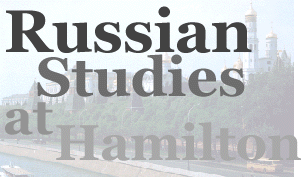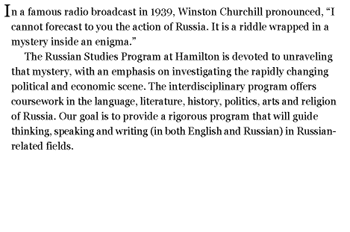



Russian Studies and Russian Language at Hamilton
Russian Studies at Hamilton is noted for its innovative curriculum and its strong commitment to student-faculty interaction. Because this is a relatively small program, faculty and students have the opportunity to work closely in and out of the classroom. Courses experiment with team - teaching and incorporation of World Wide Web resources. "Book Banning in Russia and America" was the first Hamilton College course with its own Web-page.
The language program concentrates on the development of active oral and communication skills. Beginning in the first-year course, particular attention is paid to the cultural context of the language. At the second-year level, emphasis is placed on the language of contemporary Russian media, followed by an opportunity to begin close readings of Russian literature in the original in the third year. In 1996-97, a new course will be introduced on Business Russian to help prepare students who are contemplating a job search in Russia after graduation. Students are eligible for participation in exchange programs with Russia and the successor states of the Soviet Union.
The concentration in Russian Studies requires nine courses, including at least one advanced course in Russian Language, the two-semester sequence in Russian History and the Senior Project.
Study in Russia (or one of the other republics of the former U.S.S.R.) on a semester or year program is strongly recommended for those interested in Russian Studies. In the past, Hamilton has placed students in Moscow State University, St. Petersburg-Herzen Pedagogical Institute, Irkutsk University (Siberia), Novgorod Pedagogical Institute and Vladivostok State University (Far East).
Concentrators in Russian Studies must complete a Senior Project, which usually takes the form of a thesis. One student, a 1995 graduate, won a Watson Fellowship to spend a year in Russia to expand his project on computerized fantasy games for the Russian market. A 1994 graduate wrote on "The Art of Persuasion: A Survey of Soviet Propaganda Posters," which resulted in an exhibition of posters at Hamilton?s Emerson Gallery in Fall 1995. Other recent Senior Projects include:
 Business and the Crisis
in Russian Health Care
Business and the Crisis
in Russian Health Care
 Perceptions of Tsar
Nicholas II in Contemporary Russia
Perceptions of Tsar
Nicholas II in Contemporary Russia
 A Look at Soviet Prison
Camps through the Eyes of Women
A Look at Soviet Prison
Camps through the Eyes of Women
 Soviet Russian Village
Prose: Reclaiming a Lost Heritage
Soviet Russian Village
Prose: Reclaiming a Lost Heritage
 Gender and Sexuality in
Russian Symbolist Short Fiction
Gender and Sexuality in
Russian Symbolist Short Fiction
 A Formalistic Analysis
of the Inhuman and Ab surd in the Works of Daniil Kharms
A Formalistic Analysis
of the Inhuman and Ab surd in the Works of Daniil Kharms
 Reality of the
Imagination: Fairy-tale Elements in Mikhail Bulgakov's The Master and
Margarita
Reality of the
Imagination: Fairy-tale Elements in Mikhail Bulgakov's The Master and
Margarita
 Investigation into the
Origins of Russian Obscenities
Investigation into the
Origins of Russian Obscenities
 Race in Russia:
Reflections of a Black Student in Siberia
Race in Russia:
Reflections of a Black Student in Siberia
Language students take advantage of the Russian-speaking community in the central New York area, which is home to several hundred new emigres from Belarus and Ukraine. Field trips are frequently arranged to the Holy Trinity Monastery (in Jordanville, N.Y.), the headquarters of the Russian Orthodox Church Outside of Russia. The Russian Club is one of the most active student organizations on campus and is famous for its annual Russian feasts. On occasion faculty organize study tours to Russia.
Recent Courses in Russian Studies
 Introduction to Russia:
Unraveling the "Riddle Wrapped in a Mystery Inside an Enigma"
Introduction to Russia:
Unraveling the "Riddle Wrapped in a Mystery Inside an Enigma"
 Book Banning in Russia
and America: A Cross Cultural Inquiry into the Nature of
Censorship
Book Banning in Russia
and America: A Cross Cultural Inquiry into the Nature of
Censorship
 Icons from the Stage to
the Silver Screen: Russian Theater and Film
Icons from the Stage to
the Silver Screen: Russian Theater and Film
 Early Russian History
from Rurik to Alexander II
Early Russian History
from Rurik to Alexander II
 Modern Russian History:
1861-1991
Modern Russian History:
1861-1991
 Madness, Murder and
Mayhem: 19th-Century Russian Literature
Madness, Murder and
Mayhem: 19th-Century Russian Literature
 Revolution, Revelation
and Revenge: 20th- Century Russian Art and Literature
Revolution, Revelation
and Revenge: 20th- Century Russian Art and Literature
 Politics of Russia and
the C.I.S.
Politics of Russia and
the C.I.S.
 Transformations in East
European Politics
Transformations in East
European Politics
 Studies in Russian
History
Studies in Russian
History
 Russian
Fairy Tales, Myths and Legends
Russian
Fairy Tales, Myths and Legends
 Heaven, Hell and the
Space in Between: Devils and Deities in Russian Literature
Heaven, Hell and the
Space in Between: Devils and Deities in Russian Literature
 Senior Project
Senior Project
Recent Courses in Russian Language
 Russian for the 21st
Century: Elementary Russian
Russian for the 21st
Century: Elementary Russian
 Intermediate
Russian
Intermediate
Russian
 Advanced Russian:
Readings in Russian Literature
Advanced Russian:
Readings in Russian Literature
 Advanced Russian:
Russian Press and Television
Advanced Russian:
Russian Press and Television
 Russian for
Business
Russian for
Business
 Pravda and Izvestia:
Reading the Russian Press
Pravda and Izvestia:
Reading the Russian Press
 Seminar in Russian
Language for Research
Seminar in Russian
Language for Research
All faculty in the program are active scholars and experienced teachers. Their teaching and research interests include the following:
 John Bartle (Ph.D.,
Indiana University) (Dept. of German and Russian) - Russian
language and literature; 19th-century Russian intellectual history;
Russian/Soviet film and theater.
John Bartle (Ph.D.,
Indiana University) (Dept. of German and Russian) - Russian
language and literature; 19th-century Russian intellectual history;
Russian/Soviet film and theater.
 Shoshanna Keller
(Ph.D., Indiana University) (Dept. of History) - Russian and
Soviet history; Central Asia; History of religion.
Shoshanna Keller
(Ph.D., Indiana University) (Dept. of History) - Russian and
Soviet history; Central Asia; History of religion.
 Franklin Sciacca
(Ph.D., Columbia University) (Dept. of German and Russian) -
Russian language and literature; Russian folklore; Orthodox Church;
Iconography.
Franklin Sciacca
(Ph.D., Columbia University) (Dept. of German and Russian) -
Russian language and literature; Russian folklore; Orthodox Church;
Iconography.
 Kathleen Smith (Ph.D.,
University of California at Berkeley) (Dept. of Government) -
Russian and East European politics; Comparative politics; Stalinism.
Kathleen Smith (Ph.D.,
University of California at Berkeley) (Dept. of Government) -
Russian and East European politics; Comparative politics; Stalinism.
Some of our graduates pursue the M.A. and Ph.D. in Russian Language, Literature, History, or programs in International Affairs, while others have entered business and law-related professions in Russia and other former Soviet Union nations.
The following are examples of positions held by Russian Studies alumni:
 Consultant,
International Finance Corporation, Land Reform Project (Nizhnii
Novgorod, Russia)
Consultant,
International Finance Corporation, Land Reform Project (Nizhnii
Novgorod, Russia)
 Program Coordinator,
Project Harmony, Educational and Cultural Exchanges (Petrozavodsk,
Russia)
Program Coordinator,
Project Harmony, Educational and Cultural Exchanges (Petrozavodsk,
Russia)
 Business Analyst, A. T.
Kearney, Inc. (New York)
Business Analyst, A. T.
Kearney, Inc. (New York)
 Project Manager, Argus
Trading Limited (Washington, DC - Moscow)
Project Manager, Argus
Trading Limited (Washington, DC - Moscow)
 Program Assistant,
American Council of Teachers of Russian (Washington, DC)
Program Assistant,
American Council of Teachers of Russian (Washington, DC)
 Manager, Pfizer
Pharmaceutical International (Warsaw-Moscow)
Manager, Pfizer
Pharmaceutical International (Warsaw-Moscow)
 Trade Specialist,
Steptoe & Johnson Attorneys (Moscow)
Trade Specialist,
Steptoe & Johnson Attorneys (Moscow)
 Manager, Teledyne
Isotopes (Kiev)
Manager, Teledyne
Isotopes (Kiev)